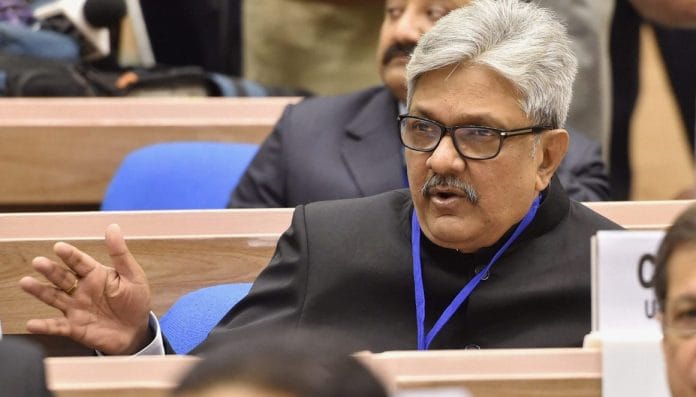Justice K.M. Joseph, who became famous for standing up to the Modi government with his 2016 Uttarakhand judgment, enters the Supreme Court today.
New Delhi: For over two years, Kuttiyil Mathew Joseph, finally sworn in as a Supreme Court judge Tuesday morning, has symbolised the tug-of-war between the government and the judiciary under the Narendra Modi administration.
Even as he took oath Tuesday, six months after the Supreme Court collegium recommended his elevation to the top court, no one could say with conviction if the judiciary had actually won.
However, the row surrounding his elevation apart, Joseph comes to the Supreme Court with a solid image as a judge with unquestionable integrity and the courage to stand up to the government, thanks to his May 2016 ruling quashing the Modi government’s decision to impose President’s rule in Uttarakhand.
“You (the government) can do this in every state. Impose President’s Rule for 10-15 days and then ask someone else to take the oath. More than angry, we are pained that you are behaving like this. That the highest authority — government of India — behaves like a private party,” Joseph had said.
Although Joseph came to be identified with the strong words, those who know him from his days at the Kerala High Court say he was never so outspoken. “Quiet”, “unassuming”, of “great integrity like his father” are the words three lawyers used to describe Joseph.
‘A man with no critics’
Integrity is perhaps not the only aspect Joseph inherited from his father, former Supreme Court judge K.K. Mathew.
He started his legal career as a junior of Verghese Kalliath – who had earlier been a junior of his father’s. Kalliath, then a senior advocate, went on to become a judge of the Kerala High Court and retired as its acting chief justice.
Joseph credits his clerk, Mr Baby, an elderly, erudite man who had also worked with his father, for encouraging him to practise independently.
“For Joseph, the clerk was a member of the family. He always referred to him as Baby chettan (elder brother in Malayalam) and that’s pretty much how he treated everyone who worked with him,” said a Kerala High Court advocate who was once Joseph’s junior.
Appointed as a permanent judge of the Kerala High Court at the age of 43, Joseph served in the court for over 10 years. In 2014, he was appointed the chief justice of the Uttarakhand High Court.
Those in legal circles say that being in the same court for extended periods without transfers is unusual for judges but shows Joseph’s goodwill and strong character.
“Except for the government, Joseph probably has no critics,” a senior advocate of the Supreme Court said.
Comparisons are frequently drawn between Joseph and his father for their engagement with the bar. In almost all his speeches for the bar, Joseph has insisted that only a well-read bar can serve the best interests of the judiciary.
In fact, the tradition of a retiring judge giving a speech on the court lawns, reminiscing about their days on the bench, began with Mathew. According to Mathew’s colleague and former CJI Y.V. Chandrachud, this was proof of how much the bar admired the judge.
No holds barred
At the Kerala High Court, Joseph is remembered for handling many environmental cases with high political stakes.
In 2013, he ordered the demolition of a Rs 150 crore resort illegally constructed on a private island in Alappuzha. Joseph, who headed the high court bench, also pulled up state authorities for clandestinely allowing the construction.
The Uttarakhand High Court verdict quashing President’s rule was a watershed in Joseph’s career.
In May 2016, just a day after the ruling, the collegium recommended transferring Joseph out of the hilly state, raising many eyebrows.
Although it was later clarified that it was Joseph himself who had sought the transfer as the high altitude of Nainital was proving unsuitable for his health, the Modi government sat on the transfer file for over a year. The collegium responded by recommending him as an SC judge, adding that he is “more deserving and suited than any other chief justice”.
Joseph will have a tenure of five years in the apex court and will retire in June 2023.







Der aaye, durust aaye …